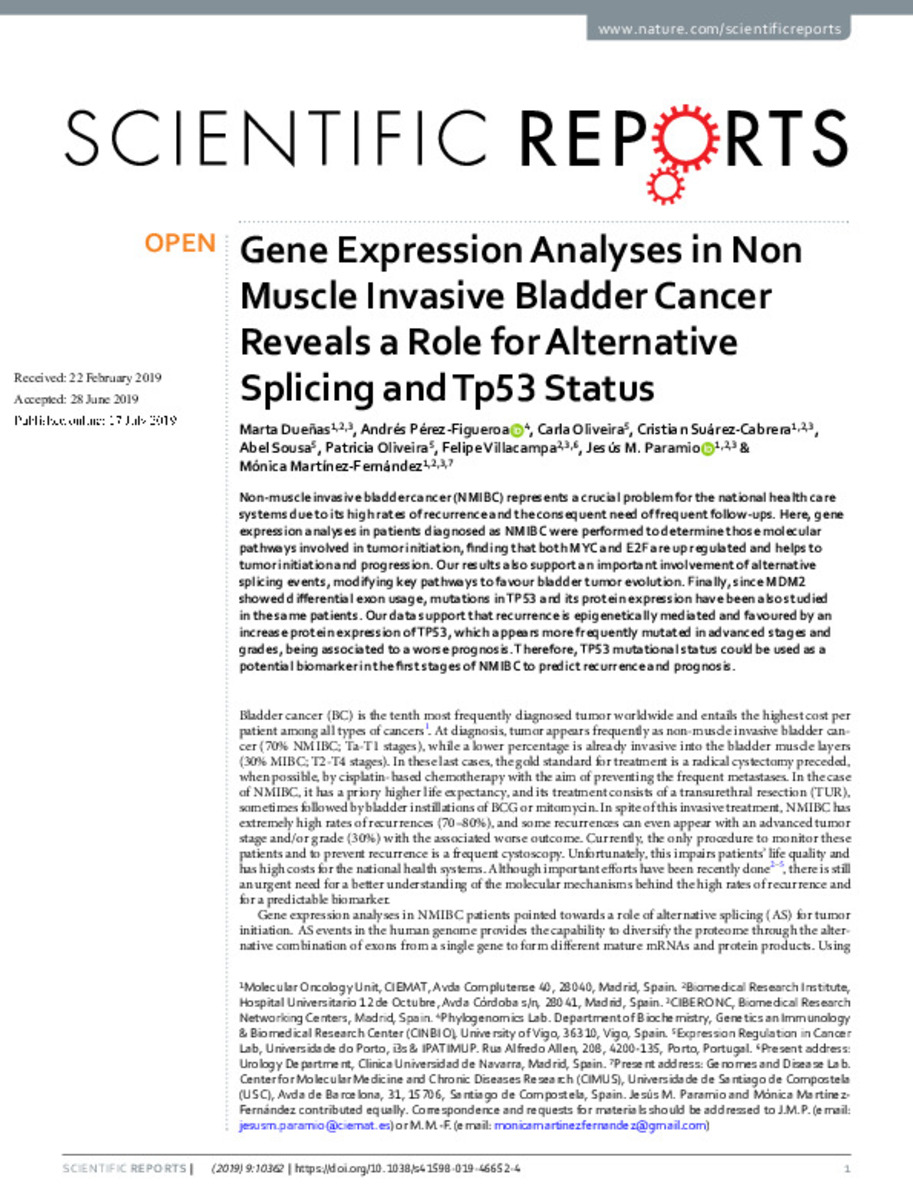Full metadata record
| DC Field | Value | Language |
|---|---|---|
| dc.creator | Dueñas, M. (Marta) | - |
| dc.creator | Pérez-Figueroa, A. (Andrés) | - |
| dc.creator | Oliveira, C. (Carla) | - |
| dc.creator | Suárez-Cabrera, C. (Cristian) | - |
| dc.creator | Sousa, A. (Abel) | - |
| dc.creator | Oliveira, P. (Patricia) | - |
| dc.creator | Villacampa, F. (Felipe) | - |
| dc.creator | Paramio, J.M. (Jesús M.) | - |
| dc.creator | Martínez-Fernández, M. (Mónica) | - |
| dc.date.accessioned | 2021-11-09T11:34:47Z | - |
| dc.date.available | 2021-11-09T11:34:47Z | - |
| dc.date.issued | 2019 | - |
| dc.identifier.citation | Dueñas, M. (Marta); Pérez-Figueroa, A. (Andrés); Oliveira, C. (Carla); et al. "Gene Expression Analyses in Non Muscle Invasive Bladder Cancer Reveals a Role for Alternative Splicing and Tp53 Status". Scientific Reports. 9 (10362), 2019, 1 - 11 | es |
| dc.identifier.issn | 2045-2322 | - |
| dc.identifier.other | PMID: 31316092 | - |
| dc.identifier.uri | https://hdl.handle.net/10171/62395 | - |
| dc.description.abstract | Non-muscle invasive bladder cancer (NMIBC) represents a crucial problem for the national health care systems due to its high rates of recurrence and the consequent need of frequent follow-ups. Here, gene expression analyses in patients diagnosed as NMIBC were performed to determine those molecular pathways involved in tumor initiation, finding that both MYC and E2F are up regulated and helps to tumor initiation and progression. Our results also support an important involvement of alternative splicing events, modifying key pathways to favour bladder tumor evolution. Finally, since MDM2 showed differential exon usage, mutations in TP53 and its protein expression have been also studied in the same patients. Our data support that recurrence is epigenetically mediated and favoured by an increase protein expression of TP53, which appears more frequently mutated in advanced stages and grades, being associated to a worse prognosis. Therefore, TP53 mutational status could be used as a potential biomarker in the first stages of NMIBC to predict recurrence and prognosis. | es_ES |
| dc.description.sponsorship | Tis work was supported FEDER cofounded MINECO grant SAF2015-66015-R, ISCIII-RETIC RD12/0036/0009, and PIE15/00076 and CB/16/00228 (to J.M. Paramio); MMF was supported by a Jose Castillejo Fellowship (CAS16/00115). | es_ES |
| dc.language.iso | eng | es_ES |
| dc.publisher | Springer Science and Business Media LLC | es_ES |
| dc.rights | info:eu-repo/semantics/openAccess | es_ES |
| dc.subject | Materias Investigacion::Ciencias de la Salud::Urología y nefrología | es_ES |
| dc.title | Gene Expression Analyses in Non Muscle Invasive Bladder Cancer Reveals a Role for Alternative Splicing and Tp53 Status | es_ES |
| dc.type | info:eu-repo/semantics/article | es_ES |
| dc.description.note | This article is licensed under a Creative Commons Attribution 4.0 International License, which permits use, sharing, adaptation, distribution and reproduction in any medium or format, as long as you give appropriate credit to the original author(s) and the source, provide a link to the Creative Commons license, and indicate if changes were made. | es_ES |
| dc.identifier.doi | 10.1038/s41598-019-46652-4 | - |
| dadun.citation.endingPage | 11 | es_ES |
| dadun.citation.number | 10362 | es_ES |
| dadun.citation.publicationName | Scientific Reports | es_ES |
| dadun.citation.startingPage | 1 | es_ES |
| dadun.citation.volume | 9 | es_ES |
Files in This Item:
Statistics and impact
Items in Dadun are protected by copyright, with all rights reserved, unless otherwise indicated.






